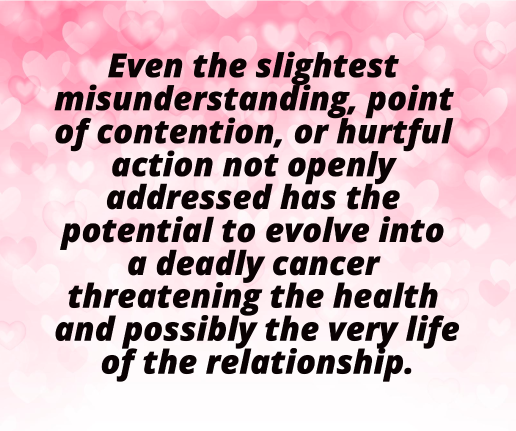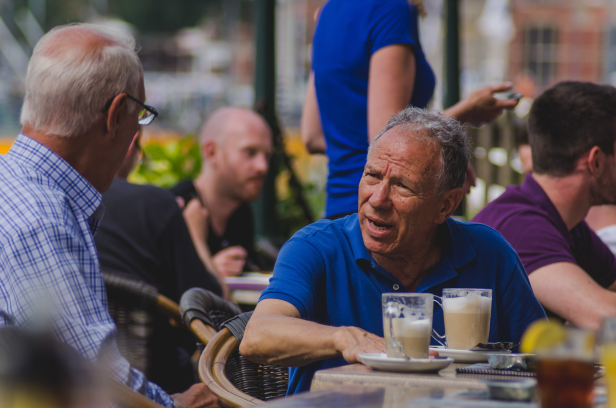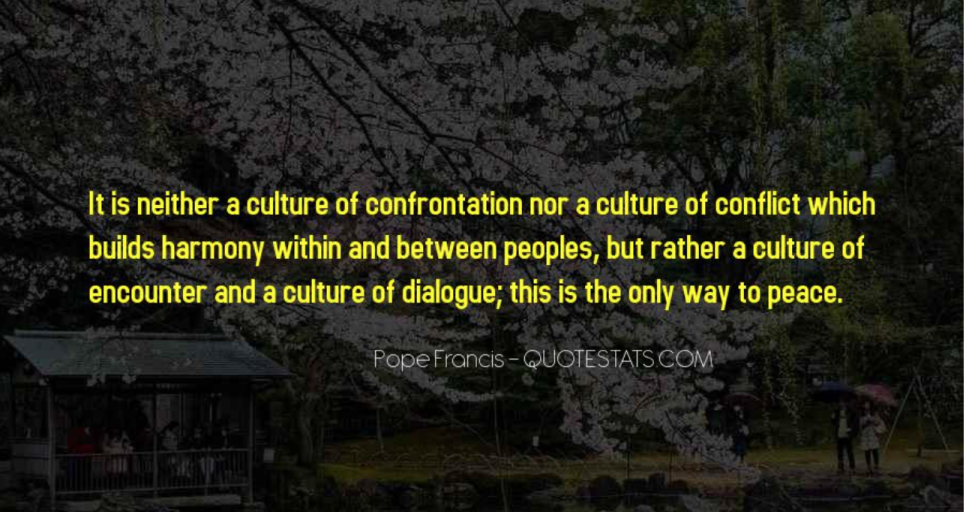One of my favorite things about writing this blog is the dialogue it creates with readers. In the feedback on my latest post on humor, several loyal readers specifically commented on one particular passage, a challenge I “snuck” into the text that they wanted me to say more about. The section in question reads:
“[H]umor should never be at a cost to another person. Actually everything done or said that could possibly create pain or alienation is the opposite of humor and I believe we have an obligation to confront that type of ‘humor’ when we experience it.”
In my presentations on relational wellness and conflict management over the years, I often talk about “caring confrontation,” which is what I believe is called for in the scenario above. This subject usually creates the most anxious/uncomfortable responses and questions of any that I address. Participants often get very confused expressions when I announce, “caring confrontations can be some of the most loving acts we do for one another.” Their reaction isn’t surprising since most of us don’t have positive life experiences around confrontation and the modeling we had seldom led to positive outcomes.
However, I think the ability to address issues in a positive and caring manner is vital for healthy relationships, which are all bound to hit bumps at some point. Even the slightest misunderstanding, point of contention, or hurtful action not openly addressed has the potential to evolve into a deadly cancer threatening the health and possibly the very life of the relationship.

I have found caring confrontation to even be an important element in my God relationship. Although the very idea of “confronting” the divinity may seem absurdly arrogant, my deciding to confront God regarding my confusion, hurt, anger, or disappointment has kept our relationship authentic and has often produced transformation and healing in me. And opening myself to God’s caring confrontation has created growth opportunities I hadn’t imagined possible!
In this post I would like to talk about caring confrontation involving folks with whom we have meaningful relationships. If and how we choose to caringly confront strangers is a very different subject. The risks are very different between the two, especially in today’s world. The possibilities and potential gains are also quite different.
When it comes to caring confrontation within close/meaningful relationships, the first step is to sort through to what extent the issue or concern belongs to me, especially my reaction or overreaction to it. Often the closer and more intimate the relationship, the greater the possibility there is for significant ownership on my part. Recognizing my own culpability is extremely important because the more ownership I can claim, the greater my potential for growth.
Just to be clear, realizing the potential for self-growth doesn’t necessarily make facing my own part in the issue easy! It takes strength and courage to become vulnerable, first with myself and then with the other person. But if I am able to become vulnerable and able to accept some ownership, the possibility of the other person risking vulnerability and being able to hear my feedback without getting defensive increases exponentially. (If you haven’t already, I highly recommend watching Brené Brown’s TED talk on the power of vulnerability.)
Here is an example of how caring confrontation played out in my own life recently. It starts with a major “growing edge” I have been trying to work on. For as long as I can remember, I’ve had a kneejerk reaction to people who seem to flaunt their wealth or believe it entitles them to special privileges or status. Sometimes this reaction is triggered by actual evidence, but other times, I know that my perceptions are colored by my own assumptions and bias.
Since I haven’t had much success in overcoming this judgmental attitude on my own despite years of working on it, I shared my struggle with Rita and invited her to help me on my growth journey by pointing out when I slip into this critical posture.
Rita agreed and took her new responsibility very seriously. Actually, her “pointing-out moments” were becoming more and more frequent and somewhat irritating! Even though she was clearly doing what I asked her to do, she was doing it a bit more enthusiastically and intensely than I had envisioned!
Before I brought the issue up with her, I first asked myself what role I played in it. Maybe my bias was showing up much more frequently than I had realized? After evaluating the evidence as objectively as I was able to, I finally decided to caringly confront Rita with what I felt was “a bit much” regarding her reminders.

Photo by Shane Rounce on Unsplash.com
I’ve learned over the years that how you introduce a caring confrontation can make all the difference in how it will go so I try to begin mine with statements such as, “This is how it came across to me and may not have at all been your intention, but…” or “This is difficult, however I value our relationship so much I feel I need to risk in sharing my feelings regarding…” I also made it a point to start off sharing my ownership in the issue.
Because I both acknowledged the bias and recognized that I had actually asked her to help me, Rita did not move into a defensive posture. In fact, she thanked me for raising the concern, explaining that she sensed I was upset at times over the last few days.
After a few moments of reflection she said, “I certainly could affirm you more for your intentional effort to confront and work on your biases. I’m not sure I know of anyone who works harder on their prejudices!” That particular comment was really helpful since I felt I wasn’t making as much progress as I wanted to.
Rita also pointed out a misunderstanding. She intended many of her remarks to be what we call “heckling”—one of my favorite forms of humor. We realized because of my frustration with myself I was unable to recognize her comments as heckling.
My decision to caringly confront Rita about her comments created healing dialogue and cleared up confusion and misunderstanding that was beginning to create some tension between us.
Another example of caring confrontation also involving “humor gone wrong” occurred recently with a close friend. This friend asked if we could go to breakfast because he wanted to talk with me about something important. I knew he was wrestling with some hard stuff regarding his adult children and I was sure this was the reason for the request.
To my surprise, what he wanted to talk about wasn’t his family, it was me! He chose to take a risk and confront me about a behavior that was hurtful to him at times. He started out by explaining that based on his personality, caring confrontation has always been difficult for him, however, he decided to talk honestly with me for two reasons. First, he really valued our friendship and lately he hadn’t been looking forward to our time together as he always had in the past. Second, his wife assured him I would be open and appreciate his honesty.
I expect his introduction helped open me up to what he had to say. Actually, it turns out his concern was focused on, of all things, my tendency to heckle both family and friends! He expressed that my heckling behavior had been a major fun component of our friendship over the years, often bringing much laughter. He even admitted he had grown into a respectable heckler himself.
However, he went on to explain that recently I began heckling him about an issue in his life that has become increasingly more sensitive and uncomfortable. “It’s like I have this big black-and-blue mark on my shoulder but because it’s under my shirt you can’t see it so you keep slapping me on that arm. Not all that hard but that spot has become progressively more sore and painful! I should have mentioned it to you sooner before it got to the point where I wasn’t looking forward to our time together.”
Heckling and playful teasing can be a lot of fun but there is a very fine line. Once it’s crossed, it can become unpleasant and even painful for another person. If not addressed it can quickly begin to damage the relationship. Obviously, I had crossed the line.
As sorry as I was to hear this, I was genuinely thankful that my friend trusted me enough to share it with me and that he valued our relationship enough that he didn’t want it to become distant, inauthentic, or compromised.
I immediately apologized for not being more sensitive not only about aggravating his sore spot, but also the fact that I could have picked up that something wasn’t quite right and should have asked him if something was bothering him.
He graciously accepted my apology and extended his forgiveness. The path to reconciliation begun with caring confrontation often travels through forgiveness. And when you join with someone on a forgiveness journey—regardless of whether you offer or are granted forgiveness—it inevitably brings you closer together and strengthens the bond you share.
Although confrontation can be risky, when done with love, it can be a springboard to the deeper, more authentic and meaningful relationships we all yearn for.
QUESTIONS FOR DEEPENING THE JOURNEY
- How comfortable are you with confronting behavior that you find upsetting or concerning? Why do you think this is? What is your life experience and beliefs regarding confrontation?
- Can you think of a time you confronted someone and it was productive—or even transformative? How about one where it was unproductive or may have even backfired? Can you identify any factors that might have resulted in the different outcomes?
- How are you at receiving critical feedback? Can you think of a specific time where someone confronted you about your behavior in which you were able to hear their criticism, accept some level of responsibility, and heal the relationship? Were there aspects of how they presented their concerns that you think allowed you to respond well? How can you use this as a model for your own caring confrontations?
- What is your reaction to the idea of “confronting” God? Are you able to share your confusion, hurt, anger, and/or disappointment openly and honestly? Why or why not?
- Have you ever been teased or heckled about something hurtful? How did it feel? Did you pretend to laugh it off or did you address it? Have you ever been accused of making hurtful comments in the guise of humor? When you are heckling someone, how do you or can you determine where the “line” is?
- What are the potential benefits of caring confrontation? Have you experienced increased authenticity, depth, and trust afterwards? What did that feel like? Is it worth the risk?
- Are there any relationships in your life that are suffering from unspoken anger or hurt feelings? What are the potential risks and rewards if you were to caringly confront the other person? Are you willing to try?
Banner Photo by Tengyart on Unsplash.com

